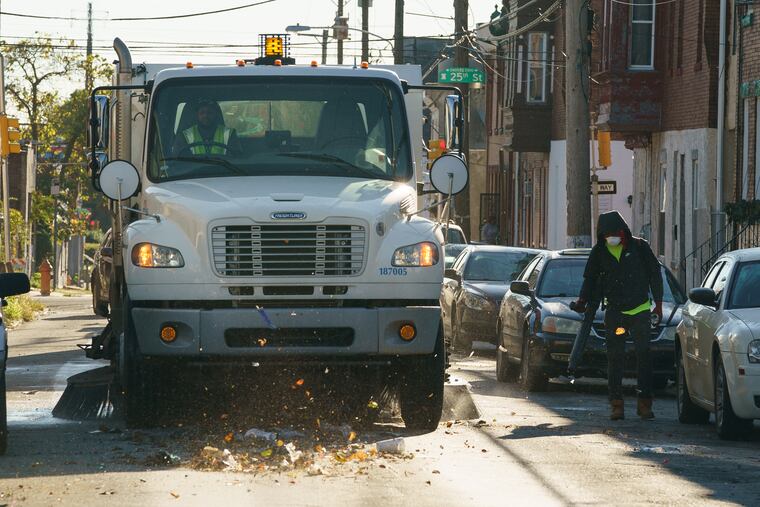Philly is expanding street sweeping — but won’t fulfill a Kenney campaign promise. Here’s what you need to know.
Some street sweeping routes resumed this spring, and the city is set to announce expansion of the service to more neighborhoods.

Mayor Jim Kenney started his second term last January with a promise to expand street sweeping to every Philadelphia neighborhood by 2023. Then the pandemic hit.
Now the administration is resuming plans to expand the program — but it won’t be citywide by the end of the mayor’s term in 2023. The administration blames the pandemic for coming up short on that campaign promise.
“The intervening 18 months of global pandemic and significant financial deficits have delayed that rollout,” city spokesperson Joy Huertas said.
Resuming citywide street sweeping was one of Kenney’s campaign promises when he first ran for mayor in 2015. He started a pilot sweeping program in 2019, and some of those routes resumed this spring. The Streets Department is planning to announce a further expansion this summer.
Details haven’t yet been released, but the city’s five-year spending plan approved last month includes $62 million for street sweeping.
Here’s what you need to know.
What street sweeping is happening now?
After going on hiatus in 2020, neighborhood sweeping resumed this April. The city’s sweeping season typically runs from April through November.
The Streets Department is “intermittently” sweeping three of the six pilot routes that ran in 2019, along with 26 routes on commercial corridors, department spokesperson Keisha McCarty-Skelton said.
The current neighborhood routes are in Kensington, South Philadelphia, and Strawberry Mansion.
When and where will street sweeping expand?
The city could launch an expanded pilot program by late summer, Streets Department spokesperson Crystal Jacobs said.
“The department is determining the most efficient and feasible means for expanding the program now that the funding has been restored,” Jacobs said.
Kenney said in his April budget address that the expansion will “focus on Black and brown communities that are often hit the hardest by illegal dumping.”
Will I have to move my car?
Yes, cars will need to be moved for the expanded sweeping program. Kenney warned residents about that in his budget address — as he had before the pandemic.
But not everyone will need to move their cars on street sweeping days.
» READ MORE: ‘If you don’t want to move your car, tough," Kenney says (from January 2020)
McCarty-Skelton said “some of the routes” will involve parking restrictions. The department will use alternate-side parking, a system in which cars have to move off just one side of the street at a time.
“The city’s densely populated neighborhoods present challenges when relocating vehicles,” McCarty-Skelton said. “Therefore, alternate street parking will be selected based on the size and density of each block.”
Will the city still use leaf blowers for sweeping?
The leaf blowers the city rolled out in 2019 — to move trash without requiring residents to move cars — are here to stay. McCarty-Skelton said they won’t be used on every route.
“They are an effective tool when clearing debris from sidewalks and on small streets that can’t fit any size broom,” she said.
The 2019 pilot program relied on leaf blowers to move trash and debris from around cars into the middle of the street, where a sweeping truck picked it up.
That approach drew criticism from some, who said it simply kicked up dust and dirt into the air. But the city’s survey of residents who lived in the pilot neighborhoods found 92% of residents supported the use of the backpack blowers. That survey also found 91% of residents were willing to move cars to help sweeping trucks access curbside litter.
What kinds of street sweepers will be used?
The city purchased new equipment last year in preparation for an expanded sweeping program.
That equipment includes mechanical broom sweeping trucks — both large and small ones to fit down different streets — backpack leaf blowers, sidewalk sweepers, and push brooms.
McCarty-Skelton said the city made those purchases before the pandemic halted its plans.
Why has it taken this long for Philly to expand street sweeping?
The sweeping pilot program didn’t start until 2019, shortly before Kenney’s primary election for a second term.
Philadelphia used to have a more robust sweeping program, but it was canceled in the early 2000s. Politicians have long blamed parking issues and residents’ resistance to moving cars for the city’s lack of sweeping.
» READ MORE: As Philadelphia readies for street sweeping, questions linger on the parking politics (from February 2020)
Since then, Philadelphia has been the only major U.S. city without a citywide street sweeping program.
Kenney vowed in his January 2020 inaugural address that he would change that by the end of his second term.
He told reporters after the inauguration ceremony that if people move cars in New York, they can do so in Philadelphia.
“If you don’t want to move your car,” he said, “tough.”